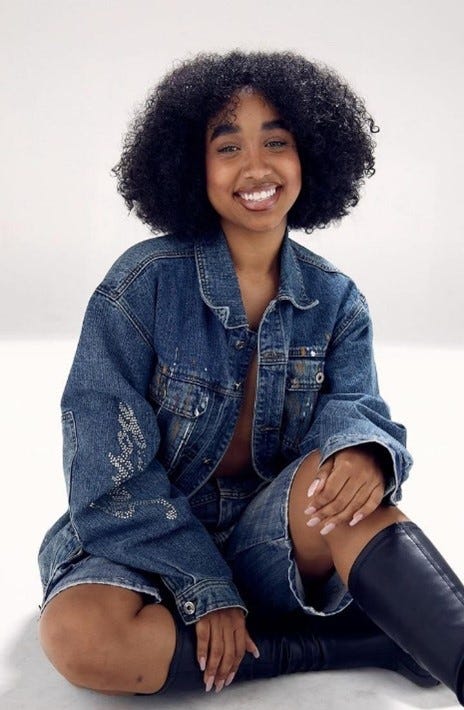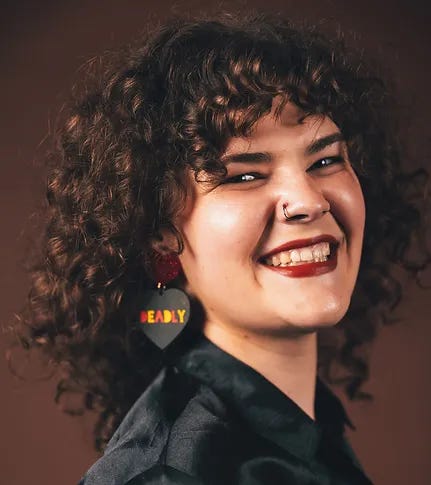An explosion of creativity, community, and colour - a short summary of Spinning Wildfire’s latest exhibition, the Last Sunset.
It follows the “By BIPOC for BIPOC” exhibition’s two-year long hiatus which left the community gripping at their seats, anticipating, yearning, stirring. And as the sun finally set, Spinning Wildfire (SWF) certainly delivered.
From fire twirlers, rappers, artworks, DJs, tarot card readers, dancers, live poetry, jazz and more, the Last Sunset had it all. Amidst the celebrations, they created a vibrant and inclusive atmosphere that only highlighted the power our community holds.
The Last Sunset was also a non-for-profit event that raised 4 thousand dollars for Sisters Inside & Para Foundation.
Both incredibly powerful organisations intent on providing support to women in prison and their families, the Aboriginal community, and Palestinian asylum seekers arriving in Australia from Gaza.
QUT Journalism Network’s Media and Communication Officer Lauren Bartholomew interviewed SWF Co-Founders Mayatu Nova and Daphne Ratcliffe to break down the night.
Interview with Mayatu Nova
What had you most been anticipating about the event, and what did the Last Sunset mean to you?
One of the largest reasons for Spinning Wildfire’s existence is to have a space for people to gather. I think overall, I was anticipating the amount of community that would attend.
Personally, I had a lot of anxieties about returning after such a long hiatus. I wanted to make sure that people were happy with what they had been waiting for, I didn’t want to disappoint anyone.

Once we had lost our original venue less than 24 hours before our show due to circumstances out of our control. We had such little time to prepare what ended up being our official venue. This made me realise the show itself is somewhat out of my control. Factors that are important to me — artistic expression, atmosphere, community and inspiration are all subjective to one’s experience.
Myself and my team can only do so much to create the space but it is truly up to the people, the artists, to create the energy that makes Spinning Wildfire what it is.
So, my greatest anticipation, in the end, which was once community attendance and ensuring I wasn’t disappointed said community had disappeared. Once the night began and I had seen all the hard work that the team and artists pulled together (all at the last minute, all at a new venue), I realised how important Spinning Wildfire was to those involved and that our core mission, to build community, had been achieved long ago, long before our hiatus. I realised it was our privilege to host our community, that had waited so long to be a part of our story again.
This is what the Last Sunset meant to me. For a while, we thought this would be our last show. We thought the sun was setting on what was already a success story and we wanted to enjoy the sunlight we had left.
In reality, the sun was setting on our hiatus, a new dusk is yet to be born and a sunrise for what is to be our next show is around the corner.
What do you hope people take away from the night?
What is important to me is that people are able to realise they hold the power to their own destiny.
Our organisation is birthed from two women, with no formal training. We merely have a message in our hearts that we wanted to express. It is without doubt that our society does not empower its people to recognise one’s true potential. Myself, a queer Afro-Latina woman and my cofounder, a proud, queer, aboriginal woman are not the poster children for an Australian success story, but we damn well should be.
This is what Spinning Wildfire is about. You don’t need to wait to make change within your community, that power is within yourself. I hope that people take away that BIPOC bodies exist in the Brisbane creative space and that there can be a future for people who wish to enter this “scene”.
When I was a teenager, even now, I struggle(d) to find spaces that were built by people like me, for people FOR me. I always wonder, why spaces like Spinning Wildfire didn’t exist in my earlier years? Why did it take until 2024, in modern Australia for this to come about? I hope people feel empowered to continue to create spaces, movements or change in their own lives — so that we can have more success stories in the Australian, BIPOC diaspora for those who want to enter the creative space.
Do you believe it was successful?
I truly do. I do believe that it was successful.
On paper, we did. Our ticket sales reached capacity, and we were able to raise funds for our charity partners.
In our hearts, we did. We had such beautiful feedback from everyone. We can’t wait to do another show and feel that energy again.
How did you aim to raise a sense of community through the Last Sunset?
I think for us, it was every artist and every member of our team.
Spinning Wildfire itself is an entity that can exist from space to space, as long as the people who create the initiative are of pure heart. I think this is the energy that allows for people who attend Spinning Wildfire to feel empowered in an honourable and authentic way.
When you watch the artists perform, you can feel their expression and connection to the audience. This goes for everyone else, our visual artists, our designers — everyone creates a unique piece of a greater puzzle, that creates our sense of belonging, of purpose and community.
And if it’s ok to disclose: how much money did you raise for your chosen charities?
We raised $4000! After paying our artists, our team & our overall expenses for the event — this was the amount we had left over. $2000 will be going towards Community For Para / Para Foundation and the other $2000 will be going towards Sisters Inside.
Interview with Daphne Ratcliffe
What had you most been anticipating about the event? And what did the Last Sunset mean to you?
I always look forward to the artists and patrons’ reactions to Spinning Wildfire, feeling the energy in the room and seeing BIPOC excellence in all its glory in a space we created for our community. Hearing feedback from our artists and patrons, both the good and the bad.

The Last Sunset was very affirming for me. As emerging event organisers, I think we went into our third event unsure if we could pull off our vision the way we wanted to, but as we have before we surprised ourselves, and I’m grateful for the opportunity to prove to ourselves that we are strong black/blak capable women.
What do you hope people take away from the night?
I hope people feel inspired by Spinning Wildfire, inspired to throw events of their own, inspired to create and express themselves, and inspired to connect with their community, put yourselves out there authentically, it might seem scary, but you miss all the opportunities you don’t take.
Do you believe it was successful?
I believe so, aside from ticket sales and capacity I think SWF lived up to our expectations and our vision, I really couldn’t have asked for a more successful event in that regard and the feedback we’ve received fills my heart. But of course, we do always seek to improve and adapt how we run our events.
How did you aim to raise a sense of community through the Last Sunset?
I think bringing queer BIPOC creatives together and providing them a space to express themselves is really our mantra. My hopes are that the artists and attendees can feel seen and appreciated in a comforting space. Spinning Wildfire does bring community together but it’s the community who bring the energy and the love to the space. The BIPOC community in Meanjin is already so rich and powerful, we’re just handing over the mic.








Share this post